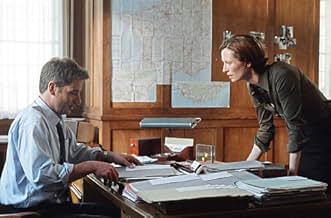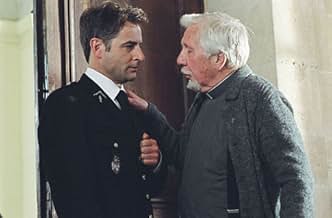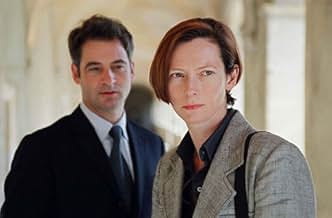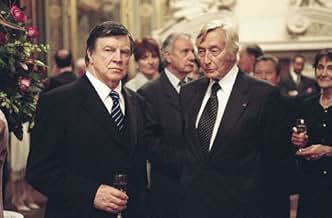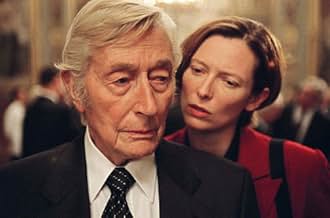AVALIAÇÃO DA IMDb
6,2/10
5,7 mil
SUA AVALIAÇÃO
Adicionar um enredo no seu idiomaTale of a former Nazi executioner who becomes a target of hitmen and police investigators.Tale of a former Nazi executioner who becomes a target of hitmen and police investigators.Tale of a former Nazi executioner who becomes a target of hitmen and police investigators.
- Direção
- Roteiristas
- Artistas
- Prêmios
- 4 vitórias no total
David de Keyser
- Dom André
- (as David De Keyser)
- Direção
- Roteiristas
- Elenco e equipe completos
- Produção, bilheteria e muito mais no IMDbPro
Avaliações em destaque
7=G=
Michael Caine carries "The Statement" on his back. In spite of an elegant cast, without him as the central character, this convoluted mess of a film wouldn't be worth watching. Telling of an aging French-Nazi war criminal who finds himself on the run and squeezed in the jaws of subterfuge, "The Statement" is too vague in its historical flashbacks, gives poor depth into its sundry characters, breaches realism with a bunch of Brits in France, never makes its agenda clear, and doesn't sort itself out well in the end...to mention just a few of the flaws. The result is a film with a lukewarm reception by critics and the public at large and little reason to watch save another excellent performance by Caine. In spite of all that, I quite enjoyed this flick. Go figure. (B-)
I dare say this film would have been much better received had it cast the film logically rather than have 'everybody's favourite Cockney' Michael Caine playing somebody called Pierre Boussard - I mean, Caine has never struck me as a "Pierre" somehow. And we can say for sure, that it couldn't have done any worse, a $22m financial loss is testament to that.
Of course I realise the book is in English, but there is a big difference between the two mediums and very rarely does a film pull off a stunt like this, see 'The Hunt For Red October' or Jude Law's Russian misfortune in 'Enemy At The Gates'. At least The Statement didn't slip into having Caine and co. adopt Gallic accents - that would have been too much to bare.
As for the film itself, it seemed a complete waste of police time to have half of the French PD chasing round after an OAP with a heart condition who'd been *ordered* to kill seven people 50 years earlier during German occupation. And for the film to set itself up as some sort of chase thriller, it very rarely gets past a stroll and the tension never really reaches the levels it should do.
All that said though, there are far worse films out there and this isn't an altogether bad way to spend 2 hours. 6/10
Of course I realise the book is in English, but there is a big difference between the two mediums and very rarely does a film pull off a stunt like this, see 'The Hunt For Red October' or Jude Law's Russian misfortune in 'Enemy At The Gates'. At least The Statement didn't slip into having Caine and co. adopt Gallic accents - that would have been too much to bare.
As for the film itself, it seemed a complete waste of police time to have half of the French PD chasing round after an OAP with a heart condition who'd been *ordered* to kill seven people 50 years earlier during German occupation. And for the film to set itself up as some sort of chase thriller, it very rarely gets past a stroll and the tension never really reaches the levels it should do.
All that said though, there are far worse films out there and this isn't an altogether bad way to spend 2 hours. 6/10
Pierre (Michael Caine) is a Nazi collaborator who has been in hiding for years. He was going to be executed for his deeds but had help escaping decades ago. Now, a judge and colonel are looking for him....as well as some Nazi hunters. But there are two things standing in their way...Pierre is a pretty deadly man and keeps killing Nazi hunters AND Pierre is still getting help from both members of the Catholic church AND government officials. Can they capture the man? And, can the judge and colonel get him to tell them WHO has been helping him?
Although Michael Caine is the star and he's good in the film, he's actually NOT featured all that prominently in the movie. Instead, it shows the various folks coming after him and explaining why...why folks would help a monster like him. Overall, it's a very interesting movie....with a tory that is quite satsifying. One complaint, however, is the lack of French actors in the film...and everyone is supposed to be French. Another is that the film is supposed to be set in the present day (2003) but I think it would have worked better having been set in the 1960s-80s. It's just hard to imagine a man as old a Pierre being such a tough character who's able to kill various Nazi hunters...it just didn't seem realistic as the crimes he committed occurred in 1944...and that would make his character about 80 (more or less) and I cannot imagine any 80 year-old being that dangerous when cornered.
Although Michael Caine is the star and he's good in the film, he's actually NOT featured all that prominently in the movie. Instead, it shows the various folks coming after him and explaining why...why folks would help a monster like him. Overall, it's a very interesting movie....with a tory that is quite satsifying. One complaint, however, is the lack of French actors in the film...and everyone is supposed to be French. Another is that the film is supposed to be set in the present day (2003) but I think it would have worked better having been set in the 1960s-80s. It's just hard to imagine a man as old a Pierre being such a tough character who's able to kill various Nazi hunters...it just didn't seem realistic as the crimes he committed occurred in 1944...and that would make his character about 80 (more or less) and I cannot imagine any 80 year-old being that dangerous when cornered.
In Norman Jewison's tepid thriller, `The Statement,' English-accented Michael Caine plays Pierre Brossard, an aging French war criminal whose past has begun to catch up with him. In 1944, Brossard, a member of the infamous Vichy regime, not only collaborated with the Nazis, but was personally responsible for the cold-blooded execution of 14 unarmed Jewish Frenchmen as well. Immediately after the war, Brossard was tried and convicted for these offenses, but somehow managed to escape before he could face his deserved punishment. In the years since, Brossard has lived his life underground, finding protection and sanctuary from a branch of the Roman Catholic Church sympathetic to his cause. And although the French authorities have been unsuccessful in their attempts to locate him, Brossard has recently found himself the target of a mysterious group of assassins, possibly members of a secret Jewish organization seeking justice for his yet unavenged crimes against humanity.
The idea of a Nazi war criminal still living in hiding all these years after the end of World War II has the makings of an interesting movie, no doubt, but `The Statement' is not that movie. To the filmmakers' credit, they do at least attempt to present Brossard as a three-dimensional character, a man who, decades after his horrendous crimes, is still seeking redemption through his pious devotion to the Church. Caine, in a deftly balanced performance, manages to make Brossard almost sympathetic while still allowing us to see the `monster' hidden beneath the ravaged soul. Unfortunately, the actor is let down by a screenplay that seems more concerned with tired cloak-and-dagger espionage routines than with a serious study of a fascinating and conflicted character. Even more annoying is the attempt on the part of the film to paint the entire Catholic Church hierarchy as a bunch of diabolical, self-serving individuals who are busy either protecting one of their own at any or all costs or acting out of political expediency rather than true moral conviction. Fans of `The Da Vinci Code' may swallow this anti-Catholic paranoia without question, but the rest of us can merely wonder why the Church hasn't been able to cop a break from the movies since Father Damien kicked the be-Jesus out of the devil in `The Exorcist,' thirty long years ago. I'm certainly no apologist for the Catholic Church (see my review of `The Magdalene Sisters'), but even we non-believers can wonder when we will be seeing a little more evenhandedness and balance in the movies' portrayal of the Church. Certainly there must be SOME well-meaning priest, nun or bishop out there that some filmmaker might consider as worthwhile movie material.
There are other problems with the film as well. Tilda Swinton, as an impassioned judge searching for Brossard, and Jeremy Northam, as a more pragmatic policeman who reluctantly joins her in her pursuit, make an annoying, constantly bickering couple who look, for all the world, like a minor-league Mulder and Scully, minus the attraction and charm. Alan Bates and Charlotte Rampling (reunited from `Georgy Girl,' though the two actors never appear in the same scene together) are wasted in minor roles. And Jewison, who was once so fine a young director, fails to bring any of the scenes in this film to life. One also questions the propriety of taking a serious subject like Nazi atrocities and using it as little more than cheap window dressing for an undistinguished, run-of-the-mill thriller.
`The Statement,' despite another fine performance from the ever-reliable Michael Caine, is a tired, lackluster and cynical exercise, strangely devoid of meaning, conviction and purpose.
The idea of a Nazi war criminal still living in hiding all these years after the end of World War II has the makings of an interesting movie, no doubt, but `The Statement' is not that movie. To the filmmakers' credit, they do at least attempt to present Brossard as a three-dimensional character, a man who, decades after his horrendous crimes, is still seeking redemption through his pious devotion to the Church. Caine, in a deftly balanced performance, manages to make Brossard almost sympathetic while still allowing us to see the `monster' hidden beneath the ravaged soul. Unfortunately, the actor is let down by a screenplay that seems more concerned with tired cloak-and-dagger espionage routines than with a serious study of a fascinating and conflicted character. Even more annoying is the attempt on the part of the film to paint the entire Catholic Church hierarchy as a bunch of diabolical, self-serving individuals who are busy either protecting one of their own at any or all costs or acting out of political expediency rather than true moral conviction. Fans of `The Da Vinci Code' may swallow this anti-Catholic paranoia without question, but the rest of us can merely wonder why the Church hasn't been able to cop a break from the movies since Father Damien kicked the be-Jesus out of the devil in `The Exorcist,' thirty long years ago. I'm certainly no apologist for the Catholic Church (see my review of `The Magdalene Sisters'), but even we non-believers can wonder when we will be seeing a little more evenhandedness and balance in the movies' portrayal of the Church. Certainly there must be SOME well-meaning priest, nun or bishop out there that some filmmaker might consider as worthwhile movie material.
There are other problems with the film as well. Tilda Swinton, as an impassioned judge searching for Brossard, and Jeremy Northam, as a more pragmatic policeman who reluctantly joins her in her pursuit, make an annoying, constantly bickering couple who look, for all the world, like a minor-league Mulder and Scully, minus the attraction and charm. Alan Bates and Charlotte Rampling (reunited from `Georgy Girl,' though the two actors never appear in the same scene together) are wasted in minor roles. And Jewison, who was once so fine a young director, fails to bring any of the scenes in this film to life. One also questions the propriety of taking a serious subject like Nazi atrocities and using it as little more than cheap window dressing for an undistinguished, run-of-the-mill thriller.
`The Statement,' despite another fine performance from the ever-reliable Michael Caine, is a tired, lackluster and cynical exercise, strangely devoid of meaning, conviction and purpose.
"The Statement" deserves far better ratings than critics have given it. In the first place, it's NOT about an ex-Nazi in flight. It's about a French collaborator, the Vichy Government, France's failure to confront the role its officials -- some still in power -- played in the Holocaust, and the efforts of right wingers in the Catholic Church to shelter the collaborator. Michael Caine is superb in the leading role, and Tilda Swinton and Jeremy Northam are excellent as the judge and army colonel who are trying to bring him to justice while those who formerly hid him seek to execute him, blaming a non-existent group of Jewish vigilantes. The supporting cast, which includes the wonderful Charlotte Rampling in a minor role as the collaborator's undivorced wife, is also quite good. I don't see how anyone can complain that this movie "drags." While there are legitimate criticisms that could be made about unexplained motives, the action moves at the appropriate pace given the complexity of the story it is telling.
Você sabia?
- CuriosidadesAs of April 2019, this is producer and director Norman Jewison's last movie.
- Erros de gravaçãoWhen Brossard searches the killer's wallet, we can see 500 francs banknotes with the head of Pierre and Marie Curie. This kind of banknote was released in 1994 and the action takes place in April 1992.
- Citações
Pierre Brossard: Pray that we meet again... in this world.
- Trilhas sonorasLe Chemin des Forains
Music by Henri Sauguet
Lyrics by Jean Dréjac
Performed by Baguette Quartette
Published by G. Schirmer Inc., administered by Music Sales Corporation
Courtesy of Baguette Quartette
Principais escolhas
Faça login para avaliar e ver a lista de recomendações personalizadas
- How long is The Statement?Fornecido pela Alexa
Detalhes
- Data de lançamento
- Países de origem
- Central de atendimento oficial
- Idiomas
- Também conhecido como
- The Statement
- Locações de filme
- Empresas de produção
- Consulte mais créditos da empresa na IMDbPro
Bilheteria
- Orçamento
- US$ 27.000.000 (estimativa)
- Faturamento bruto nos EUA e Canadá
- US$ 765.637
- Fim de semana de estreia nos EUA e Canadá
- US$ 37.220
- 14 de dez. de 2003
- Faturamento bruto mundial
- US$ 1.079.822
- Tempo de duração
- 1 h 54 min(114 min)
- Cor
- Mixagem de som
- Proporção
- 1.85 : 1
Contribua para esta página
Sugerir uma alteração ou adicionar conteúdo ausente



